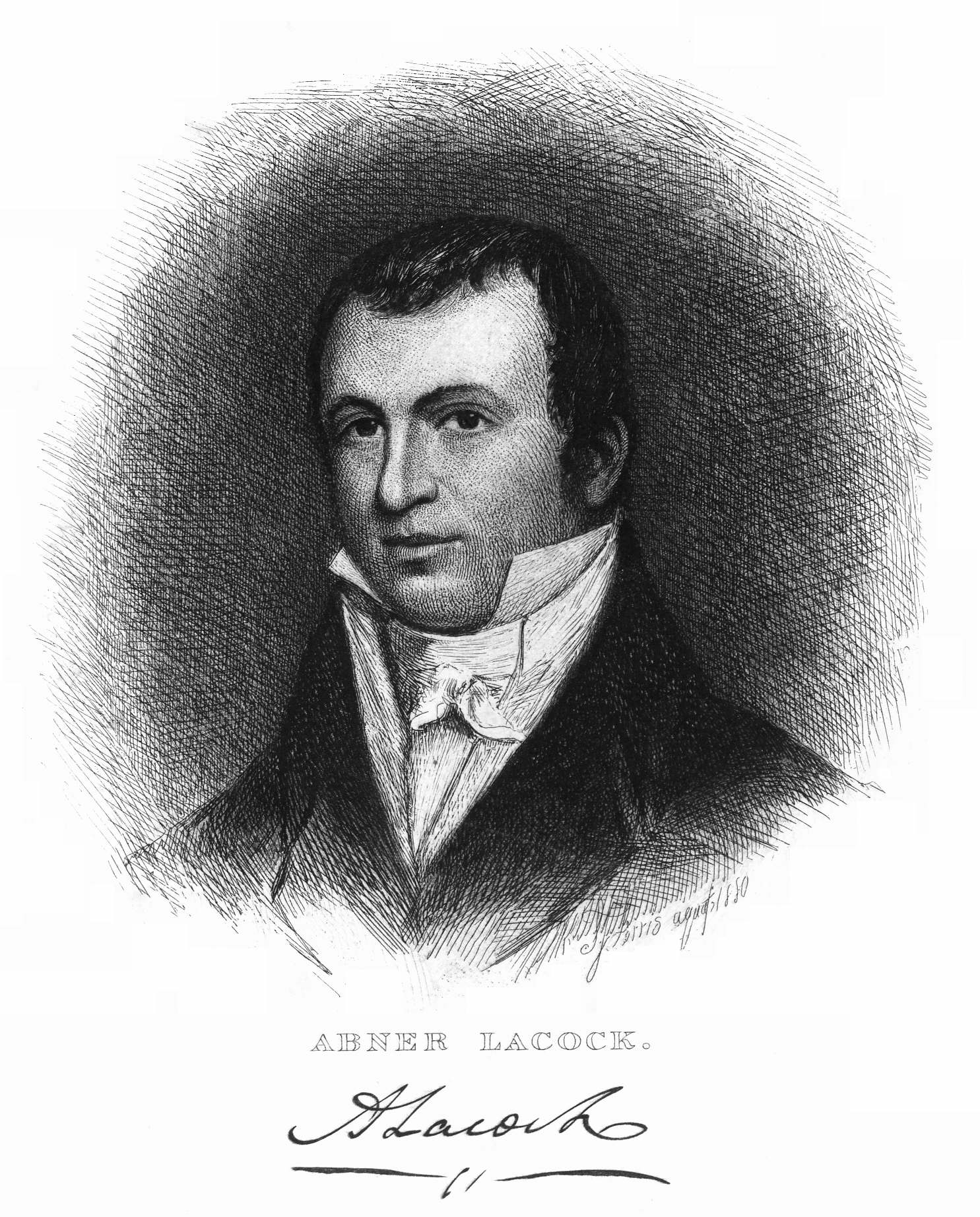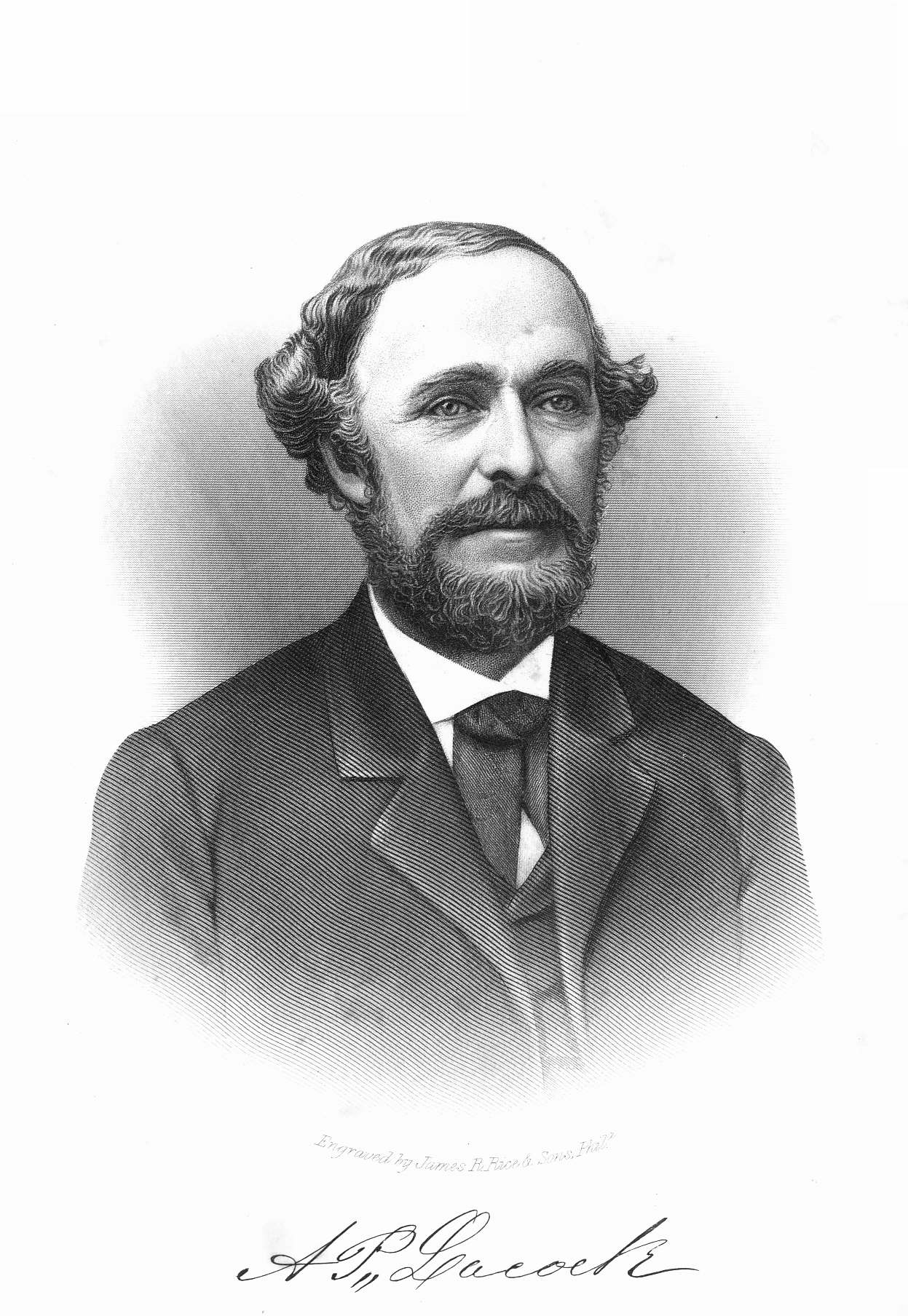Husband Gen. Abner Lacock 1

Born: 9 Jul 1770 - near Alexandria, Fairfax Co, VA 1
Christened:
Died: 12 Apr 1837 - Beaver Co, PA 1
Buried:
Marriage:
• Note: This may be the same person as : Gen. Abner Lacock.
Wife Hannah [Unk] 2
Born: Abt 1771
Christened:
Died: 1 May 1841 - near Freedom, Beaver Co, PA 2
Buried:
Children
1 F Bethsheba Lacock 3
Born:
Christened:
Died:
Buried:
Spouse: Ephraim Pentland ( -1839) 4 5
2 M Atlas E. Lacock 3
Born: Abt 1793
Christened:
Died: 15 Aug 1847 - Rochester, Beaver Co, PA 6
Buried:
3 F Minerva Lacock 3
Born:
Christened:
Died: Aft 1888
Buried:
Spouse: [Unk] Reno ( - ) 3
4 F Caroline Lacock 3
Born:
Christened:
Died:
Buried:
Spouse: [Unk] Bousman ( - ) 3
5 F Adelaide Lacock 3
Born:
Christened:
Died:
Buried:
Spouse: [Unk] Linton ( - ) 3
6 M Abner P. Lacock 7

Born: 12 Apr 1812 8
Christened:
Died: 20 Apr 1888 7
Buried:
Spouse: Did Not Marry
7 M [Unk] Lacock
Born:
Christened:
Died: 15 Oct 1818 3
Buried:
General Notes: Husband - Gen. Abner Lacock
He was born on Cub Run, near Alexandria, Virginia, his father being English, his mother French. When he was quite young he removed with his father and settled on a farm in Washington County, Pennsylvania, but in 1796 he became a citizen and one of the early settlers of what is now the town of Beaver. Sept. 19, 1796, he received from Governor Thomas Mifflin, a commission as justice of the peace for Pitt township, Allegheny County, and thus was the first justice in what afterward became Beaver County. The signal ability and natural justice, exhibited by him in this office, commended him to his fellow citizens, who, in 1801, elected him the first representative to the state legislature. This position he held until 1803, when he was, at the organization of the county, selected as one of the associate judges. The first court held in Beaver County, commencing Feb. 6, 1804, was held at his house, at that time he was one of the innkeepers of Beaver. In this capacity he served but a year when his constituents called him to serve them in the house of representatives of his adopted state for four consecutive sessions. In 1808 he was chosen to represent the counties of Allegheny, Beaver and Butler in the state senate. But a higher sphere of usefulness was to open to him. Hon. William Henry in an article on Gen. Abner Lacock, published in the Western Argus for April 19, 1837, says:
"In 1810 the question of a war with Great Britain agitated the country in every quarter, and the strong feeling of indignation in the minds of the people against the usurpations of that government, the repeated insults she had cast upon our flag, impressing our seamen, and crippling our commerce, brought many men of high character and talent into the national councils, and among them was Abner Lacock. The people of his district called him out as the War Candidate, and secured his election by a triumphant majority. His friends were not deceived in their expectations. In congress he took a bold stand for war measures, and in that period of gloom and despondency, stood firmly by the Democratic administration of James Madison in the noble effort to sustain the character and independence of the Republic, and the rights of our citizens. While in the house he took part in the proceedings on most questions of public policy, and at all times showed forth with good effect the natural sound sense and statesmanlike views of his strong and vigorous mind. In that body he possessed great influence, and with the chief magistrate to an extraordinary degree. So honorably had he acquitted himself in the house, that in the spring of 1813, the legislature of Pennsylvania, with great unanimity, elected him a senator of the United States, which station he filled with credit and ability for six years. During all this time, when not called from home in the public service, with true Republican plainness, like Cincinnatus of old, he followed the plow, and tilled the soil with laborious assiduity, attending steadily to all the duties of an American farmer; at the same time endeavoring by observation and extensive reading to make up for the want of an early education."
General Lacock served in the National House of Representatives during the Twelfth Congress, and in the National Senate during the Thirteenth, Fourteenth and Fifteenth Congresses. His friendship for Madison and Monroe was as strong as his dislike for Andrew Jackson was intense. During the closing year of his senatorial career he was a member of the committee which investigated General Jackson's conduct in the Seminole war, and was the author of the report which severely criticised the hero of Orleans. It is said that General Jackson felt the rebuke so keenly that he declared he would, the first opportunity he had, cut Lacock's ears off. General Lacock tarried in Washington several days for the purpose of giving the irate Indian fighter an opportunity to execute his threat, but was not disturbed, being permitted to leave with his ears intact.
General Lacock was a favorite with men of national character. On one occasion Henry Clay called him to occupy the speaker's chair during the discussion of an important question, a worthy compliment to a "new member." When Mr. Clay was passing down the Ohio in 1847, he stopped at Beaver Point, where he made a brief address in which he stated that he had long known Beaver County through its representatives in Congress. Said he: "I remember well Abner Lacock, who stood shoulder to shoulder with me and others before and during the late war with Great Britain, than whom Pennsylvania never produced a better and very few abler men."
He was specially active in all movements that looked toward internal improvements. Shortly after his retirement from the United States senate, he entered actively into a scheme for joining the waters of the Delaware and the Ohio by a state line of canals and railroads. On the 11th of April, 1825, five commissioners were chosen to make this preliminary survey, consisting of as follows: John Sergeant, William Darlington, David Scott, Robert M. Patterson and Abner Lacock. The latter, a member of the Board of Commissioners, was chosen to supervise the construction of the west division of the canal from Pittsburgh to Johnstown. Under his direction, mainly, this division was built, and as a compliment, the first canal boat west of the Allegheny mountains was called the "General Abner Lacock." He was subsequently chosen a commissioner to survey and construct the Pennsylvania and Ohio Canal, generally known as the "Cross Cut Canal," joining the Erie Division of the Pennsylvania Canal with the Portsmouth and Ohio Canal. This occurred in 1836, the year prior to his death. General Lacock's devotion to common-school education was so sincere and earnest, that he could be justly ranked as standing on an equal footing as a champion of popular education with Governor Wolf and Thaddeus Stevens.
General Lacock was of average height, compactly built and well proportioned. He was strong and athletic. With brown hair, blue eyes and ruddy complexion, he was a man who strongly impressed those with whom he mingled. His social life was pleasant and happy, his wife being gifted with strong intelligence and great business tact. She ably managed his affairs in his absence. [HBC 1888, 676]